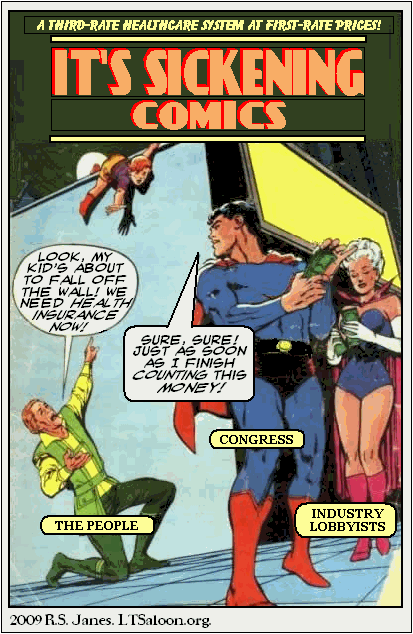Healthcare reform — Blame the doctors
There was one woman who gave me a bad time and to my knowledge, never did anything I recommended, although she came to see me for many months. As a matter of fact, I do not think that I ever figured out why she continued to see me for many months. It was back in my very first practice after I left academics, for I had left the “honor” that went with a University professorship thinking I could actually make some money.

I had walked into someone else’s insurance practice, and I was on all their panels, and I knew the patients would love me at least as much as they had loved her, for she was nowhere near as charming as I was.
I remember this one woman who gave me a bad time clearly, for she was 56 years old, very obese and very red-faced and very tired, with a bad leg. She had taken a fall down a flight of stairs at work and been through the workman’s compensation system. She was living on some kind of a pension she had received for that leg injury.
But her complaint that day was chest pain. It sounded as if it could have been angina. As I mentioned, she wouldn’t do anything I recommended to take care of it.
I was worried, really worried, and I documented every single time we spoke, and I told her that a heart attack could kill someone. She told me, each visit for many months, that her primary care physician had already warned her of that eventuality, and she was not going to go back and see him again. He yelled at her for being fat. He told her it was her very own fault. She had to follow a diet and exercise and get some weight off, all of which she was tired and unmotivated to do. She had simply stopped seeing him.
I worked very hard to get her another primary. I think she ultimately got some kind of medicine for her heart.
She was depressed, but insisted that she was not suicidal — I always ask that crucial question, although too many doctors won’t. She just had a few moments of ecstasy when she ate her sweets. I was not about to make her give that up.
I kept her on antidepressants and some anti-anxiety medications, as her insurance paid for them and I had chosen them because they had no known cardiac effects.
Her mobility was somewhat impaired by the bad leg. Her kids came to visit her once in a while, with grandchildren. Their lives were stable, they were doing well. She sat in her favorite easy chair and held court, waiting for them on their visiting days.
She could not be induced to leave the house, even to walk down the street with them, even going into the back yard. I asked why.
She told me that people were watching her. Now this did not sound like a real psychiatric paranoia, so I let her keep talking.
She told me that her employer was famous for this. She knew the car parked across the street, had the license number, had checked it out at work, had seen the guy with the digital camera. One day, someone had seen her taking out the garbage, and they had a photo of that. It had created some real problems when her pension for her leg had come up for review. The insurance company maintained that if her leg was good enough to carry trash, it was good enough to go back to work. She had needed a lawyer to preserve her pension. She had resolved never to take out the garbage again.
I remember her laughing at my naivete, something that has happened many times in my life. I did not know that insurance companies and major employers had spy networks, nor did I have any idea what they could do to a person. I thought this was harassment of some sort, but her lawyer had told her there was really no recourse.
She told me she would soon stop seeing me, because she had someone else drive her to appointments. I told her we could space them out, and I gave her a fairly large prescription because her medicines were safe and she was not actively suicidal.
She did not, however, care very much about her life. She knew she could die from her heart at any time, and she reassured me her affairs were in order, and gave me a big wet kiss, as that was the last time I ever saw her. She told me to remember her, and to remember what surveillance by an employer’s insurance company could do to someone.
I did remember, although I have not thought of her for a very long time.
Short-version: Somebody at an insurance company decided that they shouldn’t pay benefits to somebody for depression because the ID photo on Facebook showed the person smiling.
Does a single smile, or a picture of a party, negate the reality of a clinical depression? Can a photograph captured from Facebook negate a depression treatment? Can the decision be made from a photograph, by a representative of an insurance company, that someone is not depressed? Surely such a person has not made the academic study of depression that I have made.
The academic response is that a depressed person is someone who may be able to improve briefly when things are happy or good, but will find it impossible to maintain such a mood improvement.
One part of treating a depression is surely trying to do things on this everyday level to improve the spirits of a patient. This alone is not a sufficient nor complete treatment, but it is part of treatment.
The above is the literature speaking. Yours truly — good ole Docteur G adds, take photos, keep them around, build a “resource state” of the happiness and try to make it last, to pull it into everyday life.
This is an alternative treatment of depression.
Nobody looking at a Facebook page, has any right to assess from that data if someone is depressed or not. Someone who had read the literature would know for sure this could not and would not be the place.
Now, the emotional response.
I want to yell what my grandmother of blessed memory would have yelled. “Hitler Platz.” “Platz” is German for “square” (as in a town square), and she meant we were now living in Nazi Germany or the equivalent.
Even though the Facebook incident happened in Canada, I am very sure it could have happened here. I am sure that the “insurance police” that were described by my patient a long time ago still exist.
With every recommendation that people monitor their own vital signs in order to decrease insurance premiums, or push back the annual mammogram ten years — and there have been many — we are moving toward a dictatorship.
The problem is this: nobody, not anybody anywhere, has said or done anything to stop insurance companies from their inappropriate practices.
We have all heard of them terminating benefits for those who need them most.
We have all heard of people who make money hand over fist by denying treatments to the sick and dying.
I know that President Obama has been cited as a great hope, as a man working hard.
His criticism ought not just to come from conservative right.
I am sick and tired of the simplistic bipartisan politics that have ripped our nation in half and left it an open wound. As an example, the most recent healthcare reform bill passed by the House limits abortion rights — as a way to appease the right-wing voters.
There are people in the world who create value and who perform services. These include doctors, who do the best they can with a broken system. They seem actually to be helping people sometimes.
Barack Obama thinks that all doctors are people who do things only for money, and they are to be condemned.
However, Barack Obama has endorsed and helped insurance companies. He has said time and time again that insurance companies are to be kept in the health system, and the government “public option” is not even on the table.
And the pharmaceutical companies keep getting favored treatment — witness the Medicare Part D program of a few years back.
Insurance and pharmaceutical industries have the strongest lobbyists and pump the most money into campaign war chests. They certainly aren’t going to shoulder the blame for whatever deficits are perceived in American healthcare. The doctors have to be the bad guys — and bad guys have evil motives, like greed and avarice.
Nobody, certainly not the president, is ever going to say anything against the large corporations that make and keep patients ill, and then deny them treatment.
His solution is to insure the uninsurable. There is not one word about limiting profits of the insurance companies — which is done in other countries with “socialized medicine.” The corporate bandits stand unaccused behind the government shield.
People wear Barack Obama’s image on T shirts. People worship him because of his mixed racial origins.
They give him a free ride, missing the fact that he is continuing most of the policies we condemned in his predecessor. He campaigned on the concept of “change,” but continues policies of his predecessor in conducting war and even in the placement of government officials (such as the Secretary of Treasury and people in the War — I mean, Defense — Department.
We can’t allow this type of behavior in a public official simply because of his party affiliation or racial heritage.
We are not a democracy. We are an oligarchy, ruled by corporations — not only insurance and pharmaceutical. They write the laws and pay for the senators and representatives, and they can get away with just about anything.
The president is making a token statement about individuals, visiting town meetings and bringing about emotional expressions. He makes us feel like we actually have input into the system.
However, he has not taken a single stand against the corporations, both pharmaceutical and insurance, that are the root of the real problem with healthcare in America.
These large corporate interests are crucifying patients on a cross of profits.
Filed under Healthcare reform by on Nov 24th, 2009. ![]()

Leave a Comment